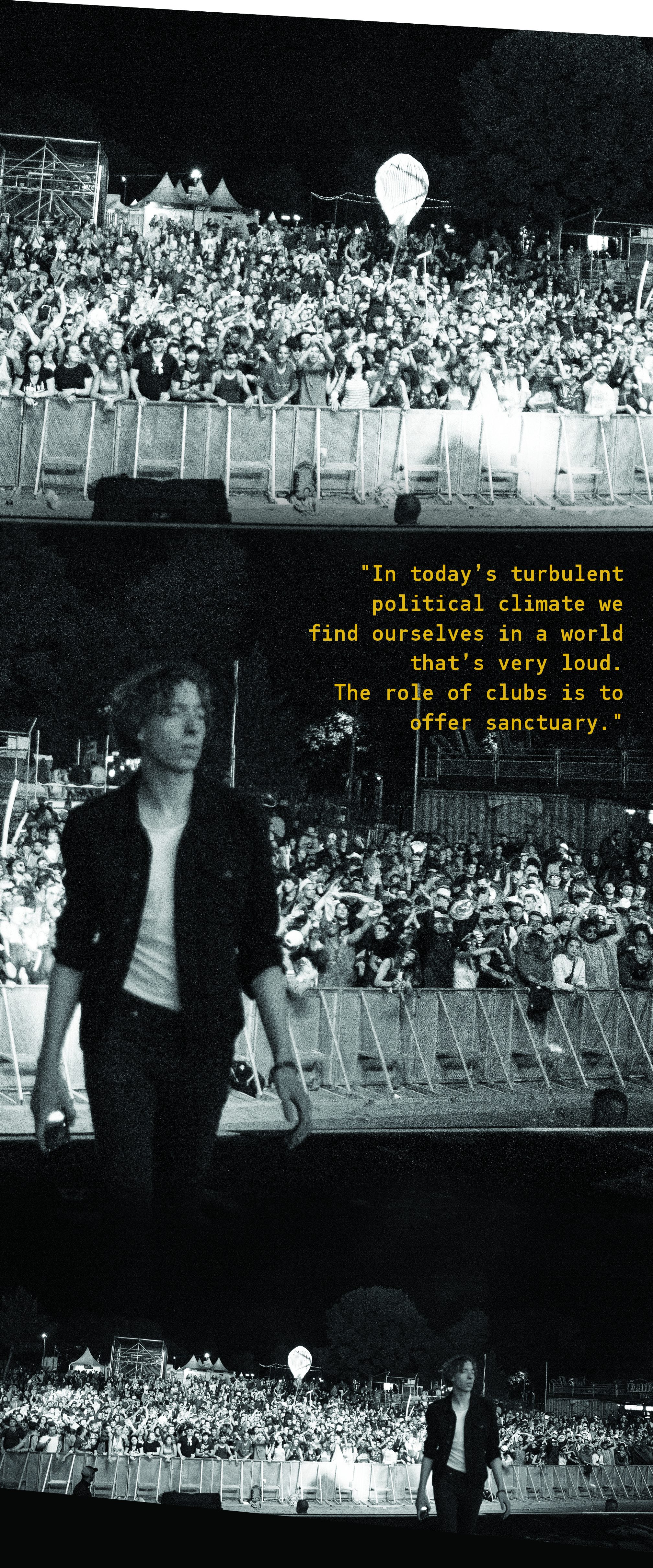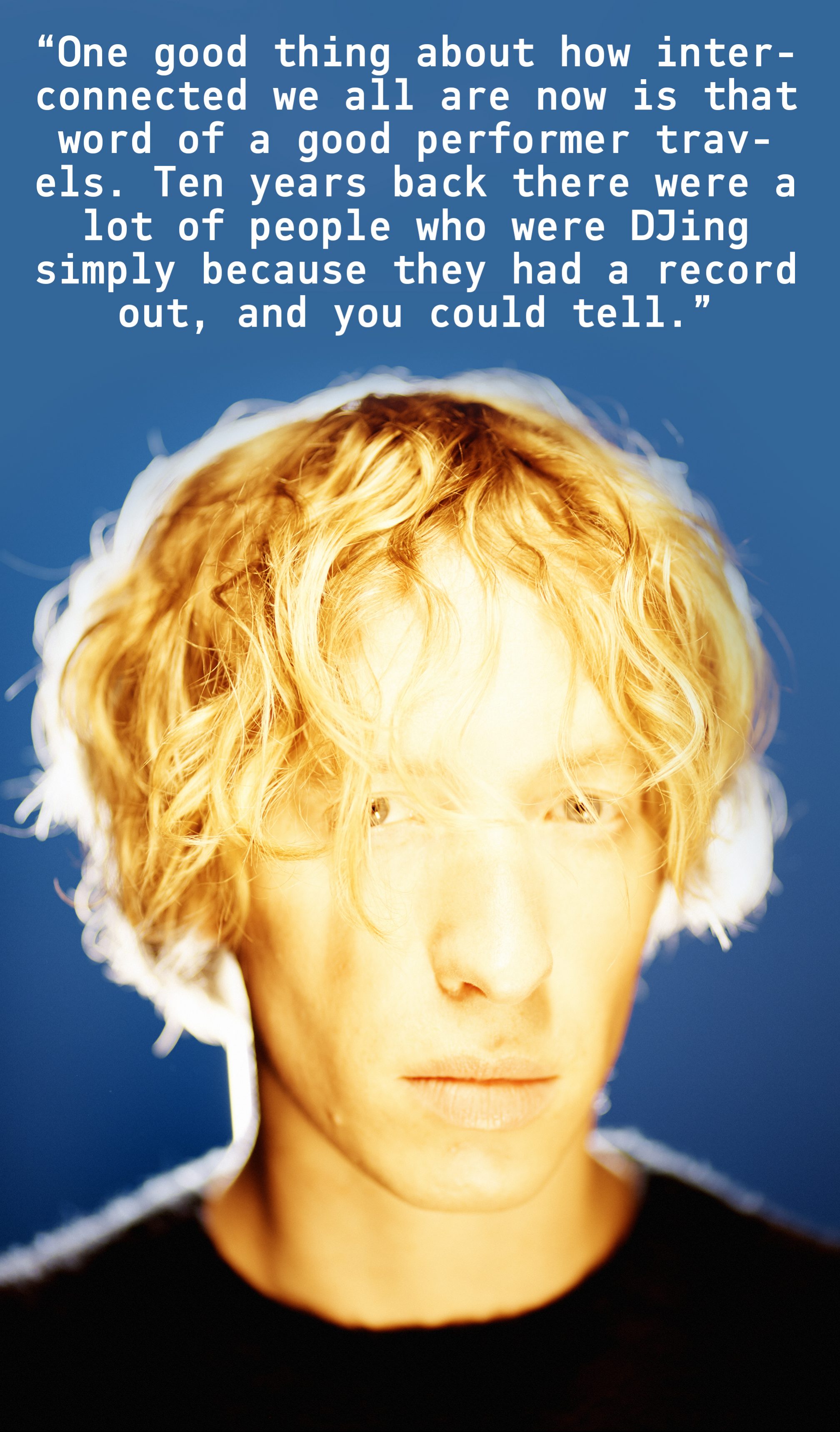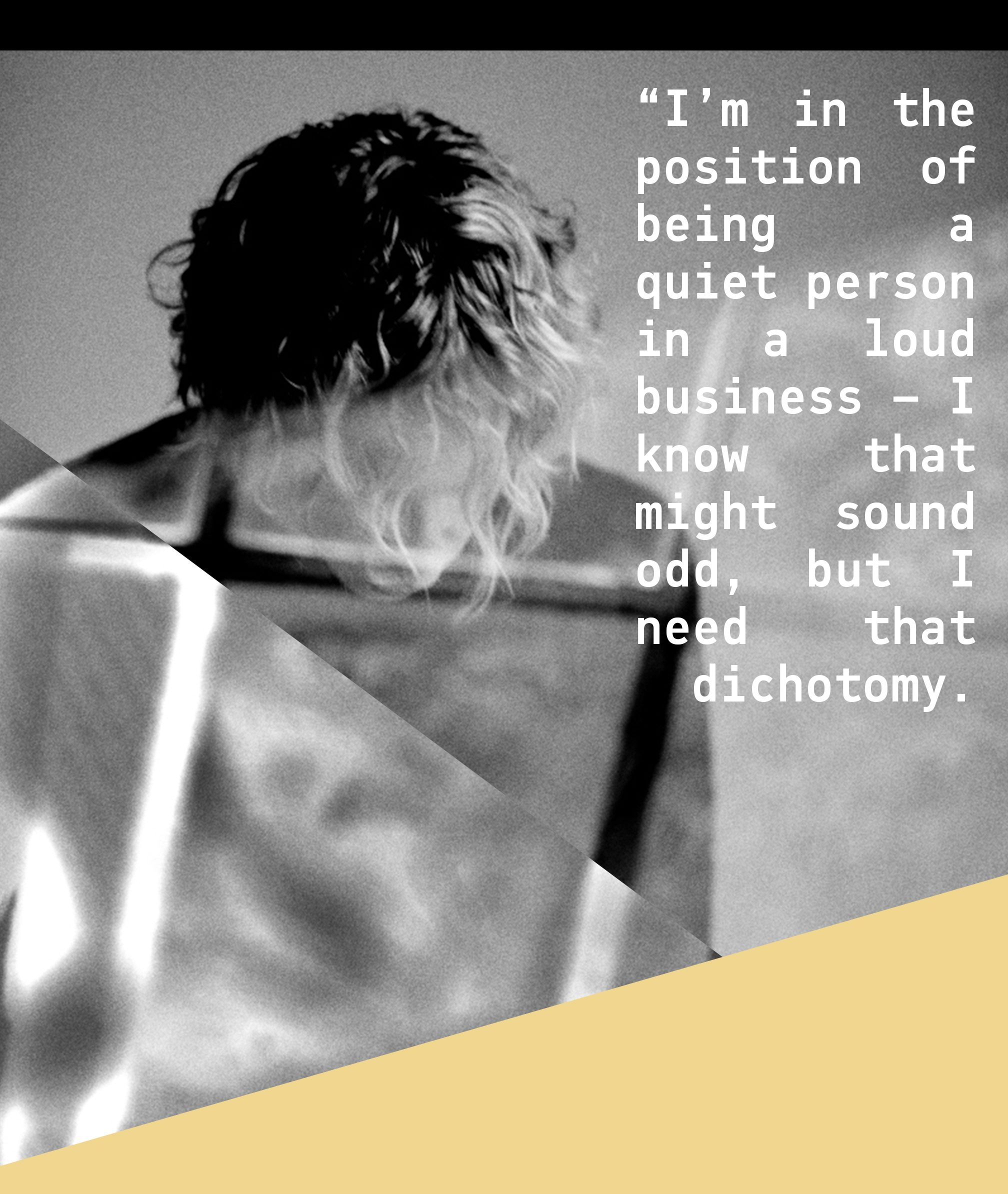 Cover stars
Cover stars
Daniel Avery: The techno auteur doing things with a distinct touch
Avery is back with a new album, ‘Song For Alpha’, cementing his place among the likes of Andrew Weatherall and Erol Alkan
The public side of Daniel Avery is on full display at Concrete in Paris at around 6pm. Yes, that’s not a typo; his last gig of the December weekend is due before Antiques Roadshow airs, a fact which initially had us stumped. But then, we’d never been to Concrete before. Boarding the Port De La Rapée barge where the club is situated on a grey Parisian evening, moving past the outdoor areas which are by now damply redundant, we have our doubts. That is, until we get to the main dancefloor and it becomes clear why the party is called Samedidimanche (ie Saturday and Sunday). Concrete recently got a 24-hour license, and now its Saturday night parties crack on until Monday at 2am. This explains why the crowd has that tired-yet-energetic feel about it – everyone’s dressed to sweat in loose fashions that could be straight from the 90s (one young, dreadlocked clubber even rocks a Coogi sweater that Biggie would love, though it wouldn’t have fitted him). Vibe-wise, Concrete feels like Club der Visionaere in Berlin – and not just because we’re by the river, or indeed floating on it. It’s because despite the doorman having a full-face tattoo (even if it was make-up, Sven from Berghain, consider yourself served), everyone is welcome here. Concrete is a real ‘basement, red light and a feeling’ kind of joint. “I feel at home as soon as I walk in”, Avery tells us. “It’s a real no-bullshit kind of place: no backstage, no VIP… this is what it’s all about for me, always has been,” he smiles.
As Avery makes his way to the booth the effect on the crowd is palpable, from when the first couple of fanboys greet him to the floor becoming a hive of seething bodies within a couple of tracks. It’s so hot in the booth that Avery shrugs off the blue shirt he was wearing over a black T-shirt and jeans, lights a smoke and gets right down to business, dancing non-stop while working the crowd to a fever pitch that belies the time of day. His un-Shazamable set is best defined as pumping, propulsive techno; we pick out a few tracks from new album 'Song For Alpha', his own ‘Sensation’, a slice of neuron-searing electro from Anthony Rother called ‘Omnitronic’ and the more austere robot funk of JF Burma’s ‘Taiga’. Everything builds to an absolutely storming finale via ‘Rote 1’, the first release from his ongoing techno project with Volte-Face aka Casper Clark, the BleeD club promoter-turned-DJ/producer and his friend of over a decade since they both booked talent at Camden’s Lock Tavern. “Something people probably don’t know about Dan is the sheer extent of his work ethic,” Clark had told us earlier in the week. “He did about four album’s worth of material that he and Erol [Alkan, Avery’s closest musical confidante and his label boss at Phantasy] had to whittle down for the new album. I’ll be honest, I wish I was half as driven in the studio, and I’m not gigging half as much as him!”

Avery’s work ethic and Alkan’s influence are nods to the other side of Avery’s personality, the one that exists away from the instant rush of the DJ booth. His new album of sustained sonic mastery of both heavy techno and more pensive moments, ‘Song For Alpha’, establishes beyond doubt that Avery is a techno ‘auteur’(a term dating back to the French New Wave films of the 1950s and 60s and the idea of film directors and later musicians being‘authors’ of their creative output). That’s why he can headline clubs and festivals with prime-time sets of sinuous techno on the one hand and produce music that reflects a range of influences galaxies beyond the techno bubble on the other – from the ‘shoegazing’, otherworldly noise of Kevin Shields’ My Bloody Valentine and the psychedelic meanderings of Spaceman 3 to his recent fascination with the industrially brutal Factory Floor and the ambient synths of Nine Inch Nails alumnus Alessandro Cortini. Avery is firmly a part of Britain’s school of ‘indie techno’, along with people like Erol and Andrew Weatherall (the other creative angel on his shoulder for whose club A Love From Outer Space his drug-chug anthem – and eponymous album track – ‘Drone Logic’ was written); fans of alternative rock who now make dance music. All share a routine that sees them immersed in the studio during the week, while gigging internationally every weekend.
At 32 but looking no older than the 20-somethings in his crowds, the tall, teenager-slim and almost gangly Avery’s been a DJ for 14 years. He’s come a long way from Project Mayhem in Bournemouth, where aged 18 he warmed up the bar for an alternative indie night that played post-punk favourites like Gang Of Four, Talking Heads, ESG and New Order alongside early electroclash like Peaches and Miss Kittin. A film-obsessed teenager (especially the work of Lynch, Kubrick and Hitchcock), when he didn’t have his head stuck in a book (Murakami, Copeland, Woolf), the young Avery was making music in his bedroom on cheap drum machines, or travelling to London for gigs, having seen his first, The Prodigy, with his father, aged just 11. There were local gigs too, but London, two hours away by train, was the place where an indie kid for whom DJ pretensions simply didn’t exist would realise that putting on records in public was something he enjoyed doing. So much so, in fact, that recently Avery's been playing all-night-long club sets, which, like his current show on NTS, are about “building the atmosphere and the sound from the ground up. My longest set was at [Brixton’s] Phonox from 2pm to midnight on a Sunday. I love being able to explore ambient and drone music – as well as electronic club music and electronica – but being able to draw a line between them and showing it all comes from the same place. I think the best clubs have a sense of quiet about them, too; not in a volume sense, necessarily, but more that you can abandon yourself there. That goes back to my days as a warm-up DJ – you need patience; the crowd and the DJ have to trust each other. That idea of patience is so important in music, I believe, as well as quiet. You need to trust, you need to pay attention... and that trust, that patience, is in such short supply now in the wider world.”
“In today’s turbulent political climate we find ourselves in a world that’s very loud, that can feel like it’s closing in on us, and the role of clubs is to offer sanctuary. Clubs don’t need to be overtly political places; I believe they’re a place of shelter from the darkness of the world. They offer a light in that darkness. That said, a DJ set is literally about the free exchange of ideas. It’s an international community… I don’t give a fuck about trade deals or the economics of all that is happening right now, but I do feel that we can’t lose the right to move around and exchange ideas – otherwise the world stops moving forward,” Avery says, his usually quiet voice steely with resolve.
During our conversations Avery is very careful about what he says and how he says it, and indeed he’s so softly spoken we worry about our voice recorder catching his musings. From the clothes he favours by French labels (he likes a simple, clean aesthetic) to his hard-to-read face – everything says Avery's a serious man who doesn’t do anything by halves. That includes deeply considering our questions, always at pains to say just the right thing. If he played poker he’d probably be very good at it, but there’s also a bit of shyness there that’s hard to reconcile with the effervescent dancer bobbing under a nest of shaggy blonde curls in the DJ booth.
“[Keeping] regular hours in the studio during the week [helps me] combat the low-level anxiety that comes from DJing when at heart I’m a pretty shy, quiet person,” Avery explains. “I’m in the position of being a quiet person in a loud business – I know that might sound odd, but I need that dichotomy. As loud as my life is in clubs, I need quiet in the studio, which is why I’m based in a converted container on the Isle of Dogs, not in a busy part of town... I’ve certainly got that in the studio, that quietness away from it all and I think that comes across on the new album. ‘Drone Logic’ [Avery’s debut] had a restless urgency to it, and while I’m still very fond of it, I can hear a younger version of myself there. There were moments of quiet on [Drone Logic], but I can hear now that they weren’t fully realised. The newer work is far more concerned with the extremes of light and dark.”

It was in a club that Avery first encountered Erol Alkan, when he caught the last few years of Trash at The End, where Erol’s indie-electro Monday nighter pushed a path clear for indie rockers to embrace more electronically influenced acts like Soulwax and LCD Soundsytem. Erol remembers meeting him there backstage in 2006: “You could tell early on: ‘Yeah, this guy is for real’,” he says. “Dan is very observant and articulate, and that’s always been the case. I think that filters through his DJing and his production. I’ve always felt that he had a sense of purpose; some urgency about him, even though he’s quite laid back. He’s very focused. I’ve seen that from DJing alongside him and eventually signing him to my label.”
Trash, of course, led Avery to Bugged Out!, where Erol was also a resident, and he eventually made his debut at Fabric in 2006, at just 21. By then he was working in Pure Groove Records (where he met Ghost Culture and Kelly Lee Owens), but when that closed in 2011 he decided to go for it as an artist. “It was a leap of faith, but I was confident that I was finally able to actualise some of the sounds in my head. I started spending countless hours in various studios across London, every day of the week, borrowing equipment from wherever I could. Every session felt like an experiment, a trip into the unknown; but the rush and excitement of discovery was totally addictive. Through reconnecting with some old friends I ended up working out of Weatherall’s Bunker studio and had the opportunity to personally hand him a CD of my work every few weeks.” That was when it all started happening: Weatherall hailed “the nice young man working in my studio” as a purveyor of “gimmick-free machine funk of the highest order” in Time Out’s ‘DJ Stars Of 2012’ feature, and a pretty much unknown Dan was asked to mix the ‘Fabriclive 66’ compilation. “They took a risk on me, which they have done from the beginning. It’s a place I’m always happy to come back to for that reason,” he says. A prestigious Radio 1 Essential Mix followed in 2014.

Fabric looms large in Avery’s professional life, as the scene of his seminal early residency but also where, in 2014, he started booking the whole club for his Divided Love events. DJ Nobu, another member of the alternative techno firmament (Japanese division), was lined up as a guest in October 2016, only to see the club lose its licence. The gig eventually went ahead on short notice at Phonox on a Sunday, a two-hander in which the outer realms of psychedelic techno were explored as they cemented their new musical alliance. Avery has plenty of time for the likes of Nobu, Dr Rubinstein of Berlin/Tel Aviv, Courtesy of Denmark (whom he just toured East Asia with), Inga Mauer, HAAi and Powder from Japan, all of whom are representative of the growing number of dance music artists who have made their name as DJs first and foremost. “I don’t think it’s true that you need to have a record out now [to make it as a DJ],” he says. “One good thing about how interconnected we all are now is that word of a good performer travels. Ten years back there were a lot of people who were DJing simply because they had a record out, and you could tell. There was something cynical and passionless about it. Those DJs I just mentioned live and breathe music. Their rise can only be healthy for the scene.”
It’s clear, though, that Avery’s auteur heart is very much in the studio these days. That’s why he’s deliberately taken his time over ‘Song For Alpha’, which includes moments of sheer dancefloor exhilaration – like the aptly titled ‘Sensation’ with its droning bass and nail-sharp kick, or the ironically-monickered ‘Diminuendo’ (meaning ‘diminishing loudness’ in Italian) which proves he’s still got his machine-funk chops as its crunchy snares give way to synapse-searing bass. But for every one of these there’s a ‘Citizen // Nowhere’, which was “the last track of 'Song For Alpha' to be finished, actually. It’s simply a pad and a lot of cut-up white noise. I knew that it had to come in the middle of the record, and it felt like the last piece of the puzzle.” It drops like glitchy, leftfield hip hop, something that smacks of Four Tet or Aphex Twin. Avery agrees: “Well, I did consider calling the album, ‘Aphex, Eno and Eccies’.” A second goes by before he cracks a smile, his trademark blond locks bouncing as he allows himself to laugh, letting his guard down for just a moment.
‘Song For Alpha’ is out April 6 on Phantasy Sound
Enjoyed ‘Song For Alpha’? Head to Mixmag’s artist page to keep up to date with Daniel Avery
This feature is taken from the February issue of Mixmag


